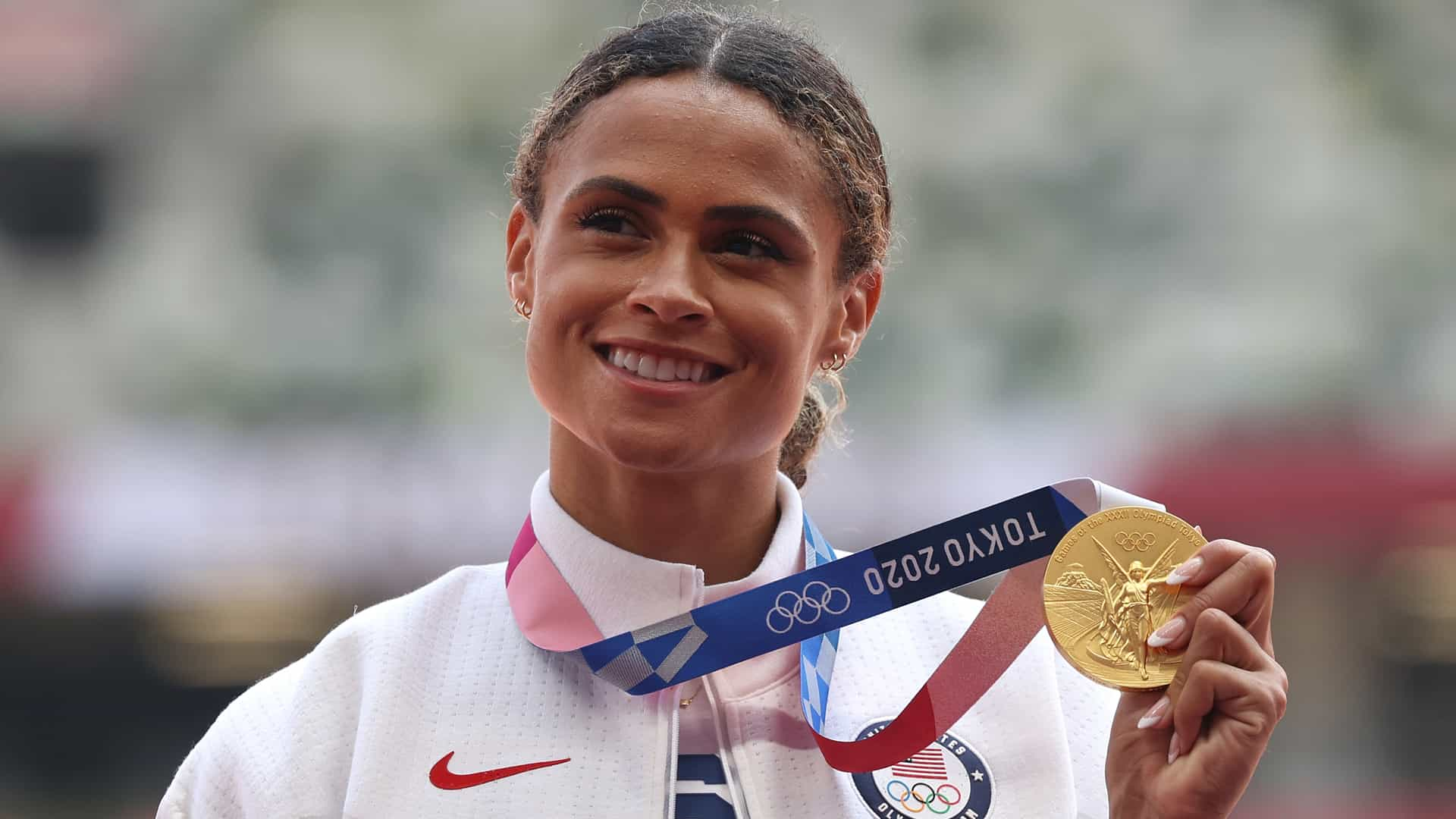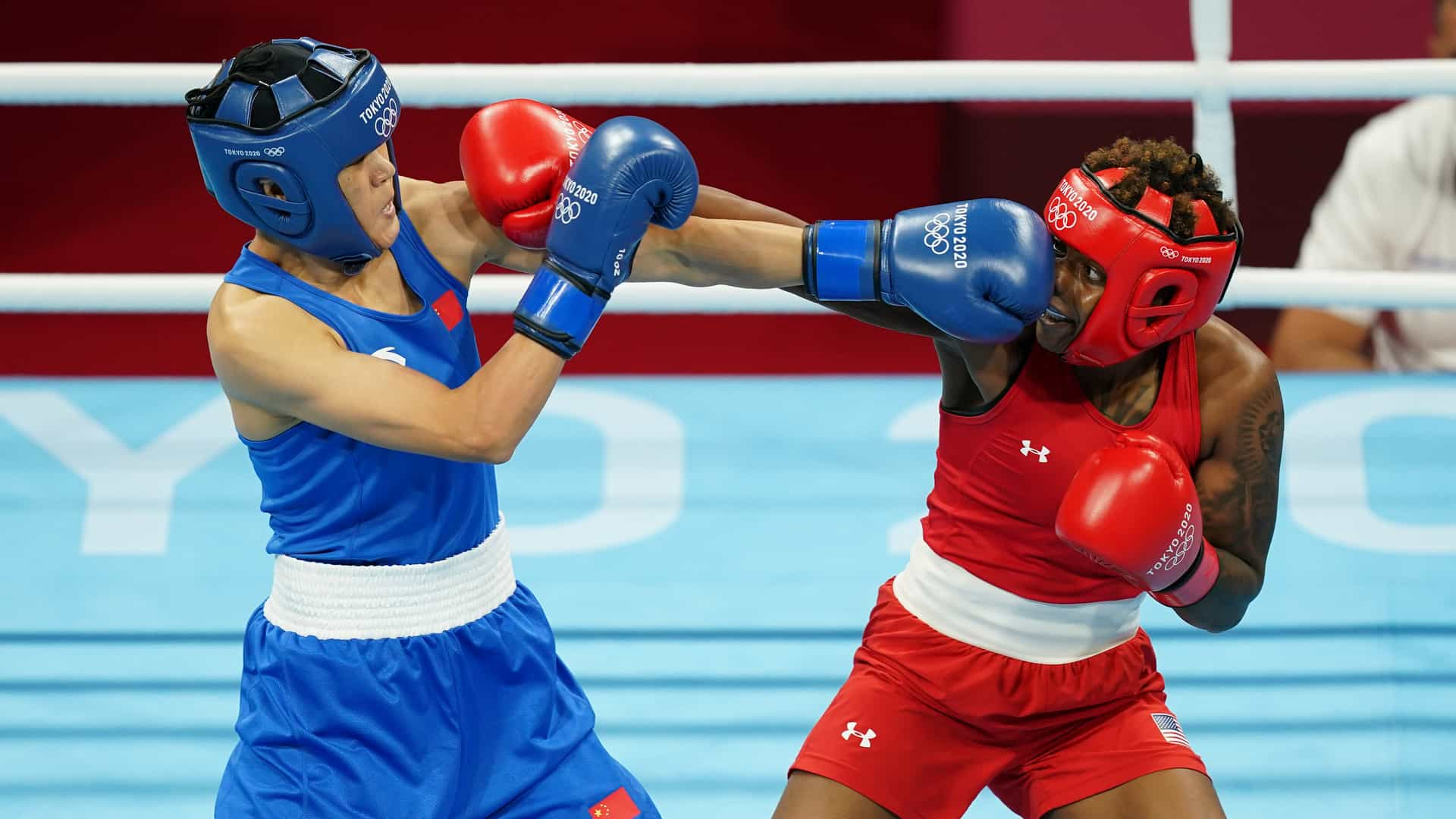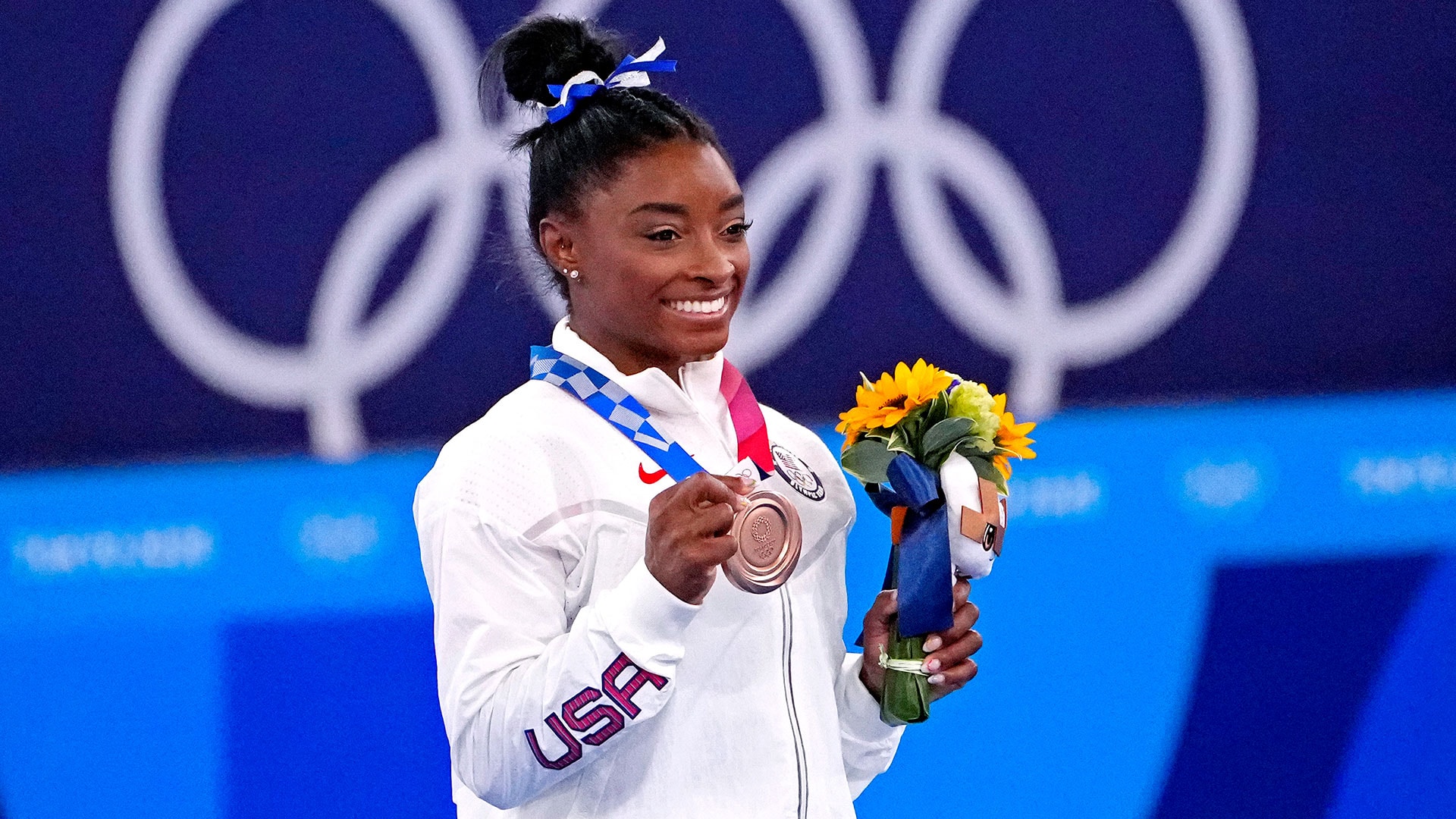To anyone fortunate enough to meet Sugar Ray Leonard, you would never expect that the cheerful, shy, and sociable person in front of you was ever a prize fighter. At 65-years-old, the Hall of Fame boxing legend is anything like his persona inside the ring.
Leonard exudes optimism and hope. His next fight is knocking out diabetes, the group of diseases that took the life of his father. Leonard is a jokester, and a storyteller, he loves to make others laugh and his smile is infectious. He's non-confrontational, the antithesis of what a boxer needs to be in the ring.
Nonetheless, Leonard fought for over 30 years of his life, and with a record of 40 wins, three losses, one draw, with 25 wins coming by way of knockout, he is considered to be one of the greatest boxers of all-time.
On the 45th anniversary of his gold medal performance at the 1976 Olympics in Montreal, Leonard recently sat down for a long-ranging interview with NBC Los Angeles to reflect on those games, his career inside the ring, the current state of boxing, how he spent his time during the quarantine, his partnership with Skechers, his charitable foundation, and so much more.
Get top local stories in Southern California delivered to you every morning. >Sign up for NBC LA's News Headlines newsletter.
Here's the full interview in its entirety:
All of our viewers need to go watch Sugar Ray Leonard's fight against Tommy Hearns 1981 in Las Vegas. Watch what happens after the 12th round. So that's going to segue into my first question, because that was a very inspirational fight for me. As the man in that ring, down on all the cards after 12 rounds, seemingly impossible to win on the judge's scorecards, your left eye swollen shut, and needing a miracle knockout to win the fight; what's going on in your head in those last two rounds? How were you able to dig deeper? What do you remember about that moment? And just how you were able to overcome the adversity that was going on?
You know, Michael that's a very good question, because that's what is required and needed to win when you're down. Composure, for sure. And the thing about it, my trainer Angelo Dundee gave it the right sound byte. He gave me the right sound byte I should say, but he said, "you're blowing it son! you're blowing it!" But he said it with such, I don't want to say fear, or whatever he did, it was just the right tone. Because we as fighters, we know when we're losing, we know. We know when the other guy is ahead of us by punches. Angelo said that to me, "you're blowing it son, you're blowing it!" That's all I needed for that little mental psychological boost.
I just want to ask one more question about that fight as a fan. I remember going into that fight, they said Thomas Hearns had never been past round 13 in his career. So it wasn't something that was commonplace for him. Did you know that, and was that part of the strategy?
I never thought about that, that never came to mind because, I mean, Tommy, had so much power and we were all so fascinated with his height, his speed. Tommy was kind of a freak of nature at 147 pounds. He was tall, like 6-foot-two, good hand-speed, knockout power in both hands, and a big heart. What was required was that I get off my butt and go be more aggressive to him. And that's what it requires. That's what it took to go there.
You've been in memorable fights over the course of your career, including that fight [against Hearns], obviously, the first fight with Roberto Duran in Montreal where you won the gold medal, and more. You're probably the best of what they call "The Fabulous Four," which includes Thomas Hearns, who I just mentioned, Duran, "Marvelous" Marvin Hagler, and yourself. So out of the four of you guys, you fought all of them, many times in some cases, which one of those is your favorite to fight against, and which fight was your favorite?
To be honest, to be perfectly honest with you, Michael. None of them. They each have their own significance. They have their own way of competing. Roberto Duran, I tell you, they call him, "manos de piedra" which means "the hands of stone," and when he hit me in the first fight. He hit me, and I'm like, 'who else is in this ring?' Because he hits so hard it felt like somebody else was in the ring besides the referee. Tommy Hearns, I gave you his height, his reach. Tommy was just a freak of nature physically. Marvelous Marvin Hagler was tough, ambidextrous, had knockout power in both hands, and he was just a tough guy. I mean, just a seriously tough guy. Who, if he gets you hurt, it's over for the most part.
That leads me to a follow up question in a second. But because you mentioned "manos de piedra," "the hands of stone," right? We all know the Hands of Stone movie that came out about Roberto Duran's life and career, so two quick questions for you: When are we going to see the Sugar Ray Leonard biopic? And what did you think of Usher Raymond's performance of you in that film?
I love Usher, man. I thought he actually played a good Ray, without question. In fact, we worked together a couple of days. But Usher did a fantastic job. As far as the biopic, I think that's on the table right as we speak. I always wanted to do my own thing too. In fact, I wanted to do a movie on "The Fabulous Four," you know, me, Hearns, Hagler, and Duran. We all fight, show us behind the scenes. I told them, let's do this before we go guys. I was joking about that. But you know, Marvin Hagler, "The Marvelous One" not being here, it's really, it's gonna be really tough, but I think it needs to be shown.
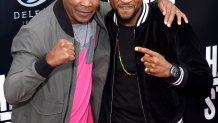
I agree. I would watch that movie. Heck, I'd write that movie. Let's go back to the follow up question that came to mind when you were talking about facing Hagler. In all of your press conferences leading up to the fight, you were talking about 'dropping seeds' and playing mind games with him in order to get him to change his style a little bit and play into yours in perfect fashion. So when it comes to the sport of boxing overall, the greatest that ever do it have not just the physical gifts, but the psychological ons as well. So my question to you is, what do you think is more important in your career? Was it just the physical gifts? Or was it the psychological part of the sport as well?
I tell you, Michael, one thing can't just do it. I mean, whether you're fast, good hand-speed, or if you have power. Everything needs to come together. Your power, your speed, your chin--a solid chin, your movement, your defense. I mean, all these things come together. That's who wins the fight. It's not just one punch. Yes, some guys hit so hard that it can happen, but the chances that happening with a top-notch champion. You know, that doesn't happen that easy. It takes all of it.
I guess you're describing the perfect fighter. The one that has the heart, the physical attributes, the hand-speed, the power, the strength, but also the psychological aspects.
Yeah, one thing can't do it. One thing, won't allow you to beat a Roberto Duran or Tommy Hearns or Marvin Hagler, or even me, you know, you got to have a combination of things.
I've dreamed about asking you this next question ever since I've been a fan of yours. I've heard you tell the story many times about winning that gold medal in 1976, in Montreal, and then after that, you say, 'I'm retired, I don't want to have a professional career, I want to go to school, I want to get an education.' You enroll at the University of Maryland, but, things in your life change that path for you, things that are beyond your control. I'm wondering if those life circumstances had never happened to and you get to finish your education at University of Maryland, and you never become a professional boxer, what do you think you would have done? What do you think that career path in life for you would have looked like?
You know, it may sound strange to most, but I wanted to be a teacher. My whole thing was about kids, helping kids, and being around kids. And that was about trying to become a teacher. And although I was only a C-average student, for the most part, and I did my homework, I think, for the most part. But boxing became a part of me. Because you know what happened? One day I put the gloves on as a nine year old, and a kid hit me. I quit that same day. I came back when I was like, 14 or 15, I put the gloves on. I found boxing, boxing found me, and we found each other. That's exactly what happened. It was inevitable that I became a boxer, because I'm nothing like I am in the ring, because I'm not confrontational, I'm shy, but sociable if that makes any sense. And all those things. I mean, when I'm in that ring, it's like me, it's tunnel vision.
You know, they say there are no coincidences. That the universe guides us, and you telling me that story resonates here [points to heart]. Like you said, it was always destiny that you were meant to be a boxer. And, you still have an opportunity to be a teacher and to help kids which I know you do. But talking about kids, boxing to me has always been about passing the torch on. Sugar Ray Robinson passing the torch to Muhammad Ali. Muhammad Ali passing the torch to you, you passing the torch on to guys like Roy Jones Jr. and Pernell Whitaker. Them passing it on to Manny Pacquiao and Floyd Mayweather. So what boxers in the ring today, the kids, do you like to watch do you think are carrying that torch right now for the sport?
You know something, Michael, and I like that question, but I can't outright answer it properly. Because there's a number of kids out there...well, I'm 65 years old, they aren't kids, but, there's quite a few talented young boxers out there who I love that I've seen them grow and seen them develop. So there's a group of young men who I think if they continue to develop the way they are, they're gonna be a superstar. I remember the first time I met with Floyd Mayweather Jr. I knew he was going to be something special, something super. It's just, it's a vibe. It's something that I'm able to feel and that's not BS. But they believe that. I always say to young boxers, 'Believe in yourself, because if you don't no one else will.' That's one of the key factors in this sport, to believe in yourself. So to answer your question, I can't name them all because I don't want to leave anyone out, and I would hurt their feelings.
I understand. I think we know some of the guys you're talking about. Names like; Triple-G [Gennady Golovkin], Canelo Alvarez, Erol Spence Jr., Terrence Crawford, Vasiliy Lomachenko, etc. But that's going to bring me to my next question: speaking of the current state of the sport of boxing, and I think what's happening now is something that has come out of the pandemic and a lot of people being stuck inside for close to a year and craving sports entertainment, So the current state of boxing has Tik Tokers fighting, YouTubers fighting, amateurs fighting celebrities, celebrities fighting celebrities, UFC fighters, essentially, non-boxers fighting, and they're getting huge numbers, Ray. They're getting large pay-per-view numbers like you used to get. In some cases, they're getting top 10 numbers. So what do you think of these YouTubers and Tick Tockers fighting and getting all the attention and the current state of boxing overall?
You know, I called the Mayweather [vs. Logan Paul] fight. Let me put it this way, was it a spectacle? Yeah, it was a spectacle. But, my cell phone rang off the hook because all my friends were calling me. My friends are major, major diehard boxing fans, and they know boxing by the way. And they were saying, 'Hey man, what a great show, man, I love the way you guys did that and he did this, he did that.' In fact, I enjoyed it. I enjoyed it. And I do understand diehard fans who say, 'Well, that guy only had one fight, or that guy only had two fights, or that guy had no fights, and he got into the ring.' And first of all, he made more money than I ever made. You know what? It was needed, and it is needed. It's entertainment. That's all it is, entertainment. It's an exhibition, and I think that's the right call, to call it an exhibition.
Like I said, I feel like a lot of these exhibitions have come from the pandemic, and the craving to see sports and things that we didn't get a chance to see for so long. So, one of the questions I had for you was about the pandemic. What were you doing during the pandemic and the state-at-home orders, give our viewers and watchers an idea of what it's like to be Sugar Ray Leonard stuck at home with his family?
I do quite a bit of traveling myself, so being locked down at home and being quarantined; not seeing my friends, hugging my friends, giving them a high five, all the things we take for granted, they were not possible anymore. They were not allowed anymore. People were telling me what I could and could not do. In fact, just going to a restaurant, I don't care what it is, whether it's an incredible restaurant or McDonald's, we couldn't do that. It's all these things we took for granted. Things we couldn't obtain, we couldn't do. I was going crazy. I admit I was going crazy. But I worked out, that's what helped me. I played tennis and that kept me going. It kept me alive. It was hard. It was a challenge for everybody, for sure.
I mentioned Muhammed Ali earlier. One of the things that came out of the pandemic and the stay-at-home orders was the murder of George Floyd and the Black Lives Matter protests across the world. Knowing Ali the way you do, and how much of an activist he was, a voice of the people, and a voice for the things that were wrong in the world, what do you think he would think about what was going on during the pandemic and the protests?
I can't speak for him, but Muhammad Ali meant so much to me. Not just as a fighter, a world champion, but as a person. He spoke his mind. He stood up to any and everybody, and he never backed off, he never backed away. When he had to be locked up because of the draft, the war, I couldn't imagine myself losing my championship belt like that. I really hope I can get across to listeners what I'm trying to say: and that is that very few people would be able to let go of their championship belt that they worked and trained so hard for, for so many years. Ali did that because Ali believed. Because he believed in what was right, Ali believed in righteousness, in racial equality.
I didn't know the man, especially not the way you did, but I feel like he would have been front and center leading a lot of those marches and a lot of those protests. But going back to what you said, you played tennis to stay in shape. You just turned 65 years old and you don't even look a day over 40, Ray. So for our listeners, other than tennis, how do you stay in shape? How do you continue to look so young? What's your secret?
Well, first of all, you have to accept the fact and you have to tell yourself, 'that I'm gonna start working out tomorrow,' and you have to do that, and you have to be consistent. For me, you know, I work out three, four, or five times a week, and I play a ton of tennis. So do a lot of cardio. I like feeling this way. I'm 65 years old. They say, 'you shouldn't look that way when you are 65 years old.' I don't know what that means, but I do work out. I like being productive too. Because when I work out in the morning, I feel productive right off the bat. When I leave my house, I feel productive because I know I'm healthy. I stimulate my brain cells, and I enjoy working out. It gets hard because we have these other duties to do; whether it's our kids, our job, or whatever. But give yourself--whether it's a half an hour or an hour--give yourself some time to work out and you will see that down the road as we get older.
We mentioned the exhibitions right? We saw Mike Tyson step into the ring in an exhibition against Roy Jones Jr. They're talking about maybe another Holyfield fight with him at their ages. Would you ever do that? Would you ever do an exhibition with the great shape that you're in? And if so, who would you want to get in the ring with?
Michael Duarte
[Laughter.] I'll do an exhibition with you. I'll get knocked out, I bet.
No, I wouldn't knock you out, but I'd hit you in the belly. Have your guy call me.
You've got it. Instead of a YouTuber fighting a boxing legend, it will be a sports reporter. I like it. I know you did that thing with Roberto Duran where you went down to Panama to find him, and you guys faced off with each other in the ring face-to-face, and you talked it out. I was thinking that that would be a fun exhibition to see. It would be interesting too. But I don't know if he would ever want to do that. He seems like he's in a different place now.
Tommy Hearns still calls me. We've been friends for years. I'm friends with Roberto Duran too, by the way, and even Hagler, when we saw each other, we gave each other hugs and everything. But Tommy wants to fight. He wants to beat me up again. Because he won the second fight. No question about that. But I always tell him, 'Tommy, you're too big for me.' Because I think he weighs like 230 pounds (Leonard weighs 165).
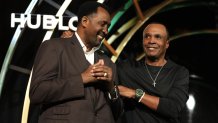
Yeah, that's not a fair fight. I know you are close with your family. We talked about the pandemic, and there's a lot of families struggling, and a lot of new families being created from the pandemic. What's the best advice you would give to new Dad's out there or new families out there?
Think about others and your family. Think about others who are not as fortunate as you are. You can't just say it, you have to act upon that. There's people out there suffering more than we are. Sometimes I complain, and then I catch myself, and say, 'what am I complaining about?' There's a lot of people suffering out there. A lot of people that are homeless, or without jobs, or what have you. And then I wake up to reality.
Speaking of that, the other people out there that are less fortunate, the people that maybe don't have the same opportunities and gifts that we were given. Could you tell us more about your foundation, the Sugar Ray Leonard Foundation, and what work you do? I know you have the Watts Empowerment Center. Can you tell us more about what you're doing for the community and how you're giving back?
My wife and I started the Sugar Ray Foundation foundation, in 2009. It's for type one, type two diabetes, and we partnered up with Children's Hospital Los Angeles, to raise awareness and raise funds that goes towards one day trying to find a way to knock out or eradicate type one, type two diabetes. I like giving back. Michael, I love to reciprocate. I say this all the time, and I'm very redundant, but it's true. I made a huge impact in the ring, but I will make an even larger impact outside the ring, by knocking out diabetes.
I like that, "knocking out diabetes." Side question on that, because of COVID-19, which diabetes is considered a preexisting condition for that. It leaves you more susceptible to getting even more sick if you test positive. Because of that, has it been even more important for you to get that message across and to fight this battle against diabetes, with the attention that it's getting now. Because of COVID-19?
I just want to fight every day. We do we actually fight every day. This comes from my mother and father. They always told me to never forget where you come from, and give back to others. And that has stuck with me for 60 years. I love to give back. I love to make a difference.
I want to talk about the history and collaboration you have with Skechers. I know you have a long history with them, as do a lot of several sports icons like yourself. One of those guys who's a Skechers icon and collaborates with them is Clayton Kershaw. I think he's the first big major baseball player to sign an exclusive shoe deal with them. Have you ever gotten a chance to meet him or speak with him or watch him pitch live?
No, I can't say I have. But you know the thing about Skechers, I've been with them for six years. It's just their philosophy, they're business-minded, their philanthropy. I mean, I'm so excited to be in a group with them, to partner with them. It's like they are in my corner, and I am in their corner. And that's why you know, this thing is so successful. In fact, I did two commercials just recently. It should be out in the fall. It's for Skechers Arch Fit.
My dad wears those obsessively. It's crazy. He loves them.
I have them on now. My wife goes crazy. She says, 'Ray, you're going to a place where people are wearing suits. You can't wear those.' I tell her, I can wear my tennis shoes. In fact, I have them on now. I love these. I wear them every day. Every day.
The reason I brought up Kershaw, and the Skechers collaboration, is that Kershaw was a guy that after over a decade of failing to reach the top of the mountain, getting to the peak and always falling short, last year in 2020, he finally won the World Series with the Dodgers and became a world champion. Do you remember when you first became a world champion? That first championship fight you got you were so young and an underdog, but you overcame the odds and won that fight. Do remember what that moment was like for you when you finally won a championship and got that belt, and were now and forever known as 'Sugar Ray Leonard World Champion.'
I came home from the Olympics in 1976. I turned professional in 1977, and I became world champion in 1979. First, the Olympic gold medal is priceless. There is no value on that. But, winning the championship belt, becoming world champion in two years, words don't justify what it feels like or what it felt like to be a champion. To raise your hands up here. Michael, it is unlike anything. This is everything.
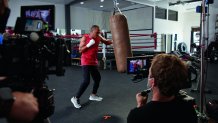
Okay, last question for me. I know you're a big dreams guy and goals guy. You've achieved so many of those goals in your lifetime, so many of your dreams, but you're not done yet. So at this point in your life, what are some of the current dreams and goals that you still have that you still want to achieve?
Well, again, it will never go away. My dreams is to be a part of knocking out diabetes, no question about that. My father passed away a few years ago. My mom is still around, she's a feisty 93 year old. I just want to help other people, and help kids in general. That's my goal, that's my next fight.

